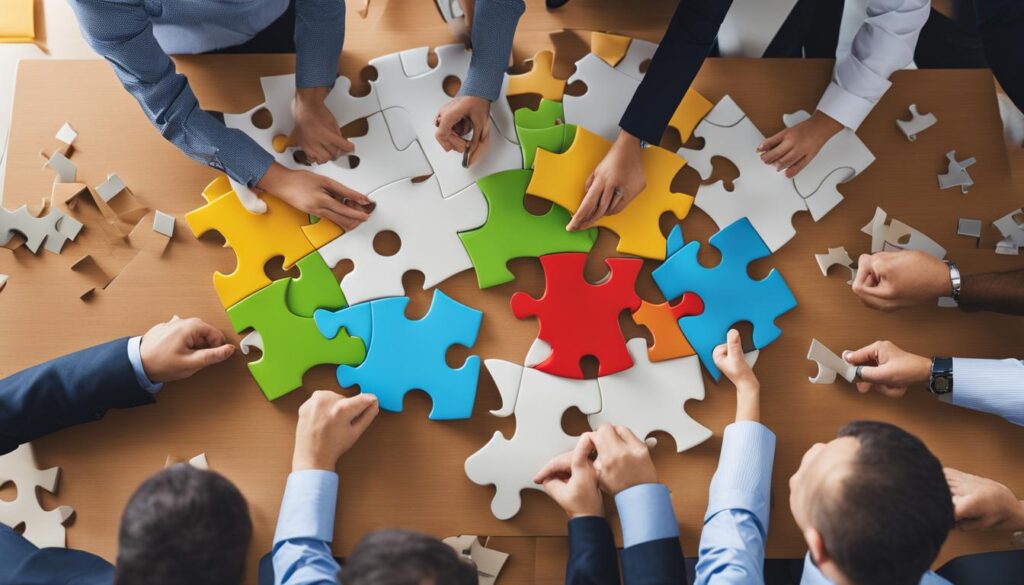Imagine this scenario: you’re the leader of a highly skilled team, working on a critical project with tight deadlines. Each team member has their own unique strengths, and collaboration is key to finding success. However, communication breakdowns, conflicts, and a lack of teamwork can quickly derail even the most talented individuals.
That’s where assessing team dynamics during the interview process becomes crucial. By asking the right questions, you can gain valuable insights into a candidate’s ability to foster collaboration, resolve conflicts, and contribute to successful teamwork.
So, let’s dive into the top team dynamics interview questions that will help you build a strong, cohesive team. By focusing on team collaboration, effective communication, conflict resolution, leadership, and problem-solving skills, you’ll be able to identify the candidates who can truly thrive in a team setting.
Key Takeaways:
- Asking the right team dynamics interview questions can provide valuable insights into a candidate’s ability to collaborate, communicate, resolve conflicts, and contribute to successful teamwork.
- Assess team collaboration skills to ensure candidates can work effectively with others and foster a positive team dynamic.
- Evaluate a candidate’s communication and conflict resolution abilities to determine their potential for resolving conflicts within a team.
- Assess leadership qualities to identify candidates who can lead and inspire a team towards achieving common goals.
- Consider problem-solving skills to determine how candidates approach challenges and contribute to finding solutions within a team.
Exploring Communication and Collaboration Skills.
Effective communication and collaboration are crucial elements for successful teamwork. When assessing candidates for their ability to contribute effectively to a team, it is essential to evaluate their communication skills and how well they can work with others. Here are some team collaboration questions that can help you gauge their proficiency in these areas:
- “Can you provide an example of a team project you were involved in where effective communication played a significant role in its success? How did you contribute to the team’s communication efforts?”
- “Describe a challenging situation where miscommunication occurred within a team. How did you handle it, and what steps did you take to resolve the issue?”
- “Tell me about a time when you had to collaborate with team members with diverse backgrounds or perspectives. How did you ensure effective collaboration and overcome any potential communication barriers?”
- “How would you handle a situation where a team member is not effectively communicating or contributing to the overall team effort? Can you provide an example of how you have addressed similar situations in the past?”
By asking these team collaboration questions, you can assess a candidate’s ability to communicate clearly, listen actively, share information effectively, and collaborate with colleagues from various backgrounds. These skills are essential for fostering open communication, building trust, and promoting a collaborative team environment.
Assessing Conflict Resolution Skills.
In any team setting, conflict is inevitable. It’s important to assess a candidate’s ability to effectively resolve conflicts within a team. Here are some interview questions that can help you gain insights into a candidate’s conflict resolution skills:
-
Describe a situation where you had a conflict with a team member. How did you approach and resolve it?
By asking this question, you can evaluate how the candidate identifies and handles conflicts. Look for their ability to communicate, listen, and find a mutually beneficial resolution.
-
Tell me about a time when you had to mediate a conflict between two team members. How did you facilitate a resolution?
This question assesses the candidate’s ability to mediate conflicts and encourage open communication. Look for their approach to understanding both sides, facilitating compromise, and maintaining a positive team environment.
-
Can you share an example of a difficult team situation that you successfully resolved? What steps did you take?
By inquiring about a challenging team situation, you can gauge the candidate’s problem-solving skills and their ability to handle complex conflicts. Look for their ability to analyze the situation, collaborate with team members, and implement effective solutions.
Assessing conflict resolution skills is vital to ensuring a harmonious team dynamic. By asking these interview questions, you can gain valuable insights into a candidate’s ability to handle conflicts and contribute to a cohesive and productive team.
“Conflict is an opportunity for growth and understanding. It’s how we handle it that defines our success as a team.” – Unknown
Conflict Resolution Skills Assessment Table
| Conflict Resolution Skills | Rating (1-5) |
|---|---|
| Ability to identify and address conflicts | |
| Effective communication and active listening | |
| Mediation and negotiation skills | |
| Problem-solving and decision-making abilities | |
| Ability to maintain a positive team environment |
Use this table to assess and rate a candidate’s conflict resolution skills during the interview process. Assign a rating from 1 to 5 for each skill, with 1 being the lowest and 5 being the highest proficiency level. This structured approach can help you objectively evaluate candidates and make informed decisions.

Evaluating Leadership Skills.
Strong leadership is crucial for fostering a positive team dynamic. When evaluating candidates for leadership positions in team settings, it is important to assess their leadership abilities and their approach to leading a team. Here are some interview questions that can help you gauge a candidate’s leadership skills:
- Describe a time when you had to take charge of a team project. How did you motivate and inspire your team members to work towards a common goal?
- How do you ensure effective communication within your team? Share a specific example of how you have facilitated open and clear communication among team members.
- Tell us about a difficult decision you had to make as a leader. How did you approach the decision-making process, and what steps did you take to ensure the best outcome for the team?
- How do you handle conflicts within your team? Describe a situation where you successfully resolved a conflict among team members and maintained a harmonious working environment.
- How do you empower and develop your team members? Give an example of how you have supported the growth and development of individuals within your team.
“A true leader has the confidence to stand alone, the courage to make tough decisions, and the compassion to listen to the needs of others. They do not set out to be a leader, but become one by the equality of their actions and the integrity of their intent.” – Douglas MacArthur
By asking these questions, you can gain insights into a candidate’s leadership style, their ability to motivate and communicate effectively, and their approach to conflict resolution and team development. Remember, effective leadership is not just about being in charge, but also about empowering and inspiring others to achieve success.
Leadership Skills Assessment Table:
| Leadership Skills | Rating (1-5) |
|---|---|
| Ability to motivate and inspire team members | |
| Effective communication and listening skills | |
| Decision-making and problem-solving abilities | |
| Conflict resolution skills | |
| Empowerment and development of team members |
Analyzing Problem-Solving Skills.
Problem-solving is a critical skill for effective teamwork. When team members can tackle challenges and find creative solutions, it leads to better outcomes and a more productive work environment. Assessing a candidate’s problem-solving abilities during an interview is crucial in determining their potential contributions to a team. By asking the right questions, you can gain insight into their approach to problem-solving and their ability to overcome obstacles in a team setting.
Here are some key interview questions that can help you evaluate a candidate’s problem-solving skills:
- Can you share an example of a difficult problem you encountered in a previous team project? This question allows candidates to demonstrate their ability to handle complex issues. Look for their analytical thinking, ability to dissect problems, and their approach to finding solutions.
- How do you approach problem-solving in a team? Understanding a candidate’s collaborative problem-solving approach is essential. Look for their ability to communicate and listen to others, their willingness to seek different perspectives, and their adaptability in finding solutions that satisfy all team members.
- Describe a situation where you had to think outside the box to find a solution. This question reveals a candidate’s creativity and resourcefulness. Look for their ability to generate innovative ideas, their willingness to take risks, and their persistence in finding alternative solutions.
- How do you handle disagreements or conflicting ideas during problem-solving? Conflict often arises during problem-solving processes. Look for a candidate’s ability to navigate disagreements constructively, their willingness to consider different viewpoints, and their ability to facilitate compromise and consensus within a team.
- Can you provide an example of a time when you successfully solved a problem as a team? This question assesses a candidate’s ability to work collaboratively and contribute to successful problem-solving outcomes. Look for their teamwork skills, communication abilities, and their ability to collaborate effectively with others to achieve a shared goal.

By asking these problem-solving focused questions, you can gauge a candidate’s ability to think critically, work collaboratively, and navigate complex challenges within a team. Remember to listen carefully to their responses and consider how their problem-solving skills align with the requirements of the role and the dynamics of your team.
| Benefits of Strong Problem-Solving Skills in Teams | Challenges of Weak Problem-Solving Skills in Teams |
|---|---|
|
|
Conclusion.
Asking the right team dynamics interview questions is essential for evaluating a candidate’s ability to enhance teamwork skills. By assessing their communication and collaboration skills, conflict resolution abilities, leadership qualities, and problem-solving capabilities, you can determine their potential to contribute to a positive team dynamic.
Effective communication and collaboration are key to successful teamwork. Candidates who can demonstrate strong communication skills and the ability to work well with others are more likely to enhance teamwork and achieve collective goals.
Additionally, evaluating a candidate’s conflict resolution skills allows you to gauge their ability to navigate and resolve conflicts within a team constructively. Leaders who can effectively address conflicts foster trust and maintain a harmonious working environment.
Finally, a candidate’s leadership qualities and problem-solving capabilities are crucial for driving team success. Leaders who can make sound decisions and guide the team through challenges are instrumental in building trust within a team and achieving desired outcomes.
FAQ
What are some team dynamics interview questions to ask candidates?
Asking the right questions during a team dynamics interview can give you valuable insights into a candidate’s ability to foster collaboration, resolve conflicts, and contribute to successful teamwork.
How can I assess a candidate’s communication and collaboration skills?
Effective communication and collaboration are essential for successful teamwork. Use these interview questions to assess a candidate’s ability to communicate effectively and work well with others.
How can I understand a candidate’s approach to conflict resolution within a team?
Conflict is inevitable in any team setting. These interview questions will help you understand how a candidate approaches and resolves conflicts within a team.
What interview questions can help me evaluate a candidate’s leadership abilities?
Strong leadership is crucial for fostering a positive team dynamic. Use these interview questions to assess a candidate’s leadership abilities and their approach to leading a team.
How can I evaluate a candidate’s problem-solving abilities within a team?
Problem-solving is a critical skill for effective teamwork. These interview questions will help you evaluate a candidate’s problem-solving abilities and their approach to overcoming challenges within a team.
How can asking the right team dynamics interview questions enhance teamwork skills?
Asking the right team dynamics interview questions can provide valuable insights into a candidate’s ability to collaborate, communicate, resolve conflicts, and contribute to successful teamwork. By evaluating a candidate’s communication and collaboration skills, conflict resolution abilities, leadership qualities, and problem-solving capabilities, you can assess their potential to enhance teamwork skills and contribute to a positive team dynamic.


